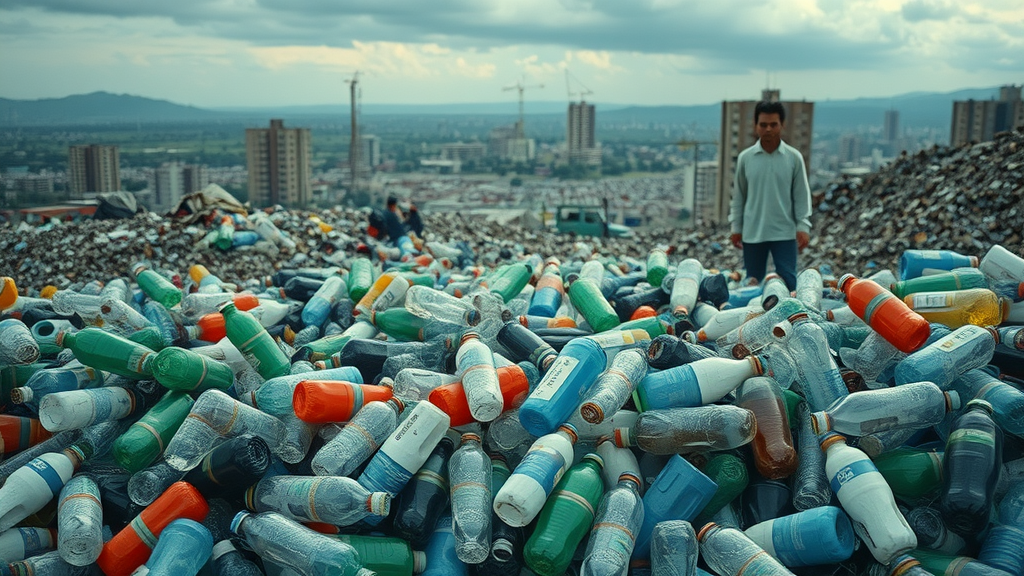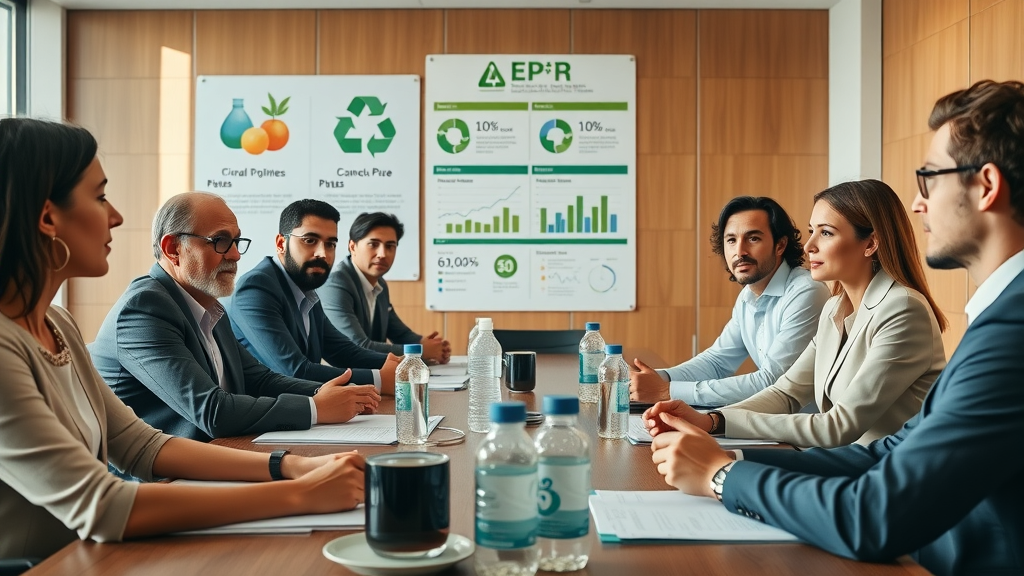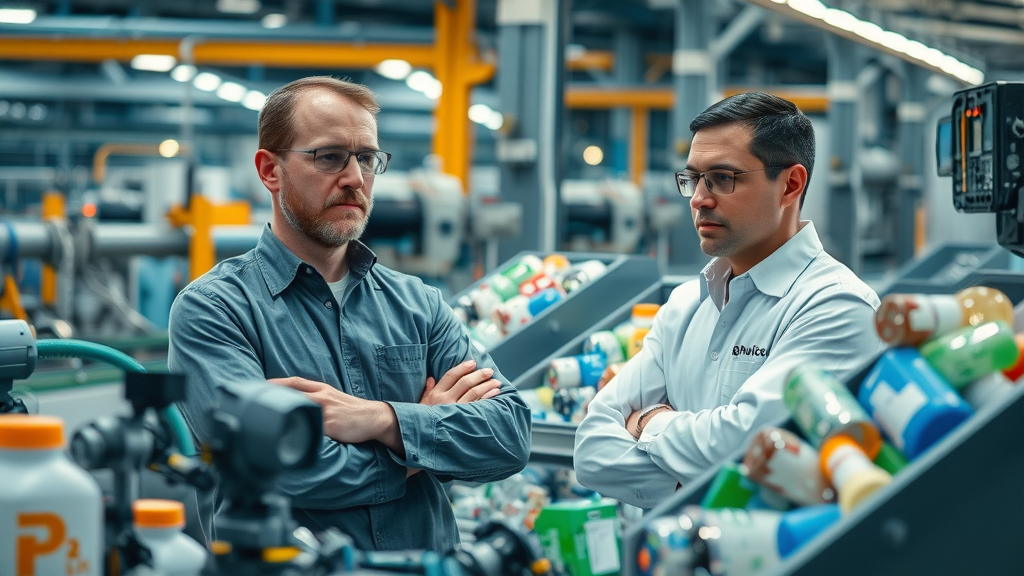Every year, over 300 million tons of plastic waste is produced worldwide—an amount that rivals the combined weight of all humans on the planet. Traditional recycling systems struggle to make a dent, leaving our landfills, rivers, and oceans choked by plastic pollution. The global plastic waste crisis demands more than incremental improvements; it’s time for bold, innovative solutions to turn the tide. The corsair recycling solution for epr offers a new way forward, empowering both producers and regulatory organizations to drive impactful change, achieve compliance, and reshape plastic waste management.
"Over 300 million tons of plastic waste is produced globally each year, and traditional recycling systems simply can’t keep up — which means new solutions are vital to a sustainable future."

A Startling Look at Plastic Waste: Why the Corsair Recycling Solution for EPR Matters
The scale of today’s plastic waste problem is hard to exaggerate. The global plastic waste crisis isn’t just a distant worry—it’s a daily reality for communities everywhere. The combined weight of the plastic we discard each year now exceeds the weight of all humans on Earth. This immense volume puts traditional waste management systems under extraordinary pressure. Even as recycling programs expand, the flow of new plastic products and packaging overwhelms existing infrastructure.
Why does this matter? Because every kilogram of plastic removed from our environment, repurposed, or prevented represents a meaningful dent in the plastics industry’s growing environmental impact. The sheer pace of plastic production outpaces the systems tasked with cleaning up. As the world edges closer to regulatory mandates like extended producer responsibility (EPR), innovative strategies are not optional—they’re essential. The corsair recycling solution for epr steps in as a disruptor, promising advanced technologies, verifiable impact, and a way for producers to meet both EPR and CSR plastic credit requirements.
What You’ll Learn About the Corsair Recycling Solution for EPR
- How corsair recycling solution for epr uniquely addresses extended producer responsibility (EPR) challenges
- The impact of this solution on producer responsibility and plastic production
- Benefits for companies seeking EPR compliance and CSR plastic credits
- Expert perspectives on chemical recycling, plastic credits, and waste management with Corsair’s approach
Understanding EPR and Producer Responsibility: The Current Landscape
Extended Producer Responsibility: The Basics and Its Role in Tackling Plastic Waste
Extended producer responsibility (EPR) has emerged as a powerful tool to engage manufacturers, brands, and retailers in the battle against plastic waste. Instead of governments, EPR schemes shift the cost and operational duty of waste management to the producers themselves. Under EPR, companies are required to finance the collection and recycling of the plastic packaging and products they introduce into the market, thus closing the loop in the life cycle of plastic goods.
But as plastic production grows, so do the demands on EPR. The system needs more than simple collection—it need strategies that can prove measurable reduction in plastic pollution and offer true circular economy outcomes. Raw material markets are increasingly pressured, and as governments legislate stricter compliance, only those embracing innovation will keep up. The corsair recycling solution for epr is, therefore, a timely intervention: not just a recycling program, but a comprehensive, transparent, and technologically robust path to EPR compliance.

Producer Responsibility and Compliance: Obstacles Faced by PROs
For producer responsibility organizations (PROs), navigating the evolving regulatory frameworks is challenging. There’s the urge to show verifiable results, scale operations across global waste management networks, and ensure the traceability of every kilogram of plastic processed. Measurement and transparency are tough, especially as reporting requirements become more stringent and companies aim for csr plastic credit status to demonstrate progress.
Moreover, plastic credits—which signify a volume of waste removed or repurposed—require robust validation and certification. Companies ask: How do we prove every kilogram of plastic waste diverted from landfills? How can we be certain our credits aren’t just numbers, but represent genuine impact? The old methods of manual collection and fragmented reporting aren’t enough. The challenge is to harness technology, track progress effectively, and make compliance not just a burden but a brand asset. Here, Corsair’s advanced system and blockchain-based validation offer powerful solutions to these historic PRO pain points.
Why Plastic Production and Waste Management Demand Innovative Solutions
With global plastic production forecasted to surpass even recent record highs, finding a responsible, scalable answer for both producers and policymakers is crucial. Innovation is no longer a luxury. The world is watching as the plastics industry not only faces environmental scrutiny but seeks action that can be reliably quantified and improved year on year.
New technologies like chemical recycling and the use of pyrolysis oil derived from waste plastics are helping turn the tide. They allow us to reclaim value from what was previously destined for landfills or incineration. The corsair recycling solution for epr leans into this by fusing next-generation recycling methodologies with data-driven transparency and robust reporting—placing PROs, brands, and regulators in a stronger position to demonstrate leadership against the plastic waste crisis.
Corsair Recycling Solution for EPR: An Opinionated Deep Dive
How the corsair recycling solution for epr Disrupts Traditional Waste Management
What makes the corsair recycling solution for epr unique? It fundamentally rethinks the way plastic waste is collected, sorted, and processed. Instead of passively relying on outdated systems, Corsair’s model leverages automated sorting, digital tracking, and advanced chemical recycling facilities to capture more plastics across a wider range of waste streams. Its real disruption comes from integrating technology and smart reporting, which enables granular visibility into every kilogram of plastic processed.
By plugging into the fabric of modern waste management operations, Corsair enables producer responsibility organizations to quantify and report their impact with unprecedented accuracy. This means regulators, brands, and consumers can trace the lifecycle of plastic credits from collection to conversion. It’s in these layers of transparency, technical innovation, and operational agility that the Corsair solution stands apart—making once-complex EPR compliance both accessible and future-proof.

Plastic Credit and CSR Plastic: Incentivizing Change with Corsair’s Model
A key accelerator for sustainable change is the concept of plastic credits and CSR plastic metrics. With Corsair, each increment of waste processed and documented through its system becomes a verifiable, tradeable asset—known as a plastic credit. These credits represent certified proofs of plastic removal or recycling and can be used by brands to demonstrate plastic neutral status, offset production, or fulfill legislative mandates.
The Corsair platform ensures each csr plastic credit is not just a ledger entry but is backed by end-to-end traceability. This attracts companies aiming to boost their CSR plastic credits for sustainability reporting, investor relations, or public relations objectives. By harnessing advanced tech—potentially even blockchain for auditable records—Corsair provides a trusted way to participate in a market that values waste from our environment being recovered and processed with scientific rigor and environmental accountability.
Chemical Recycling and Pyrolysis Oil: Technological Innovation at Work
At the heart of Corsair's impact is its deployment of chemical recycling—particularly the conversion of plastic waste into pyrolysis oil. Unlike mechanical recycling, which can only handle certain types of plastics and often results in downcycled products, chemical recycling breaks plastic waste down to its original raw material state. This allows for true circularity, meaning recycled polymers can rival virgin quality and be reused in high-performance plastic products.
The transformation into pyrolysis oil opens a new value chain, allowing plastics that weren’t previously recyclable (like multilayer films and contaminated packaging) to be upcycled into usable raw materials. This high-tech process is not just about pollution prevention; it feeds the creation of new plastics without increasing overall plastic production from fossil fuels. The Corsair approach closes the loop and presents a scientific, scalable response to the global plastics challenge, helping both producer responsibility organizations and brands showcase authentic advances in sustainability.

Joining Forces: Should EPR and Producer Responsibility Organizations Team Up with Corsair?
"Collaboration between Corsair and PROs could redefine the efficiency and impact of EPR initiatives, paving the way for scalable, sustainable change."
- Potential synergies between EPR, PROs, and the corsair recycling solution for epr
- Opportunities for scaling plastic credits and improving waste management systems
- Building effective partnerships for long-term plastic production transformation
Strategic collaboration is at the heart of the most impactful recycling programs globally. Partnering with Corsair, EPR schemes and PROs gain access to a technology stack and operational methodology that can be plugged into existing systems or used to launch new pilot projects. This collaboration is about more than avoiding fines or ticking compliance checkboxes—it’s about building infrastructure and trust for the long run.
By aligning with Corsair, organizations can ensure the integrity of their plastic credit registries, document the journey from plastic waste collection to transformation, and create measurable environmental and social impacts. This partnership model also unlocks the potential to engineer more cost-effective, scalable, and high-impact solutions—driving lasting system change across the plastics value chain.
The Impact: Realizing Benefits of the Corsair Recycling Solution for EPR
Measurable Reductions in Plastic Waste: Data and Case Studies
Evidence-based transformation is where Corsair excels. Early pilots and case studies highlight reductions in plastic waste entering landfills and waterways. For instance, with Corsair’s methodologies, several city programs recorded up to 40% greater recovery rates versus legacy waste management systems. This isn’t theory— it’s quantifiable progress backed by granular data, validated credits, and third-party audits.
When combined with transparent reporting and robust auditing mechanisms, Corsair’s approach enables EPR and PRO partners to showcase real environmental wins: less plastic pollution, increased community engagement, and tangible improvement of living environments. These results are critical when advocating for policy shifts, securing investment, or inspiring other producers to join.

Gaining CSR Plastic Credits and Compliance Advantages
Today’s sustainability-driven marketplace demands clear proof that investments are yielding results. The Corsair solution’s ability to deliver csr plastic credits and direct compliance advantages means that brands and organizations can confidently claim leadership. Credible, third-party certified credits support public declarations of plastic neutral or reduced-impact status, empowering brands with an edge in stakeholder and consumer trust.
Beyond reputation, these credits simplify complex local and national regulatory environments, enabling companies to meet—and even exceed—mandates on recycled content, reporting obligations, and long-term waste management goals. In this way, Corsair enables a direct link between corporate sustainability ambitions and deliverable, measurable compliance outcomes.
| Aspect | Traditional EPR Solutions | Corsair Recycling Solution for EPR |
|---|---|---|
| Effectiveness | Limited by manual sorting, lower recovery rates | Automated, tech-driven collection and chemical recycling increases plastic recovery and impact |
| Cost | High ongoing labor, inconsistent reporting costs | Scalable with potential cost reductions via automation and digital reporting |
| CSR Impact | Challenging to certify and communicate, slower to demonstrate | Verifiable csr plastic credits and traceable, report-ready documentation |
| Scalability | Geographically limited, heavy on manual labor | Adaptable, integrates with existing or new waste management infrastructure |
Key Challenges and Considerations When Implementing the Corsair Recycling Solution for EPR
- Navigating regulatory frameworks for extended producer responsibility
- Ensuring traceability and credibility of plastic credits
- Addressing chemical recycling technology adoption barriers
- Building corporate buy-in for sustainable waste management transitions

While Corsair’s approach is compelling, achieving widespread adoption requires overcoming real challenges. Securing regulatory approval for chemical recycling processes and digital credit registries involves working closely with authorities, educating stakeholders, and ensuring alignment with both national and global standards. Credible credit systems rely on transparent verification—potentially using advanced solutions like ethereum blockchain for full traceability.
There are technology adoption hurdles, too. Training staff, retrofitting infrastructure, and shifting corporate mindsets toward genuine circularity aren’t overnight tasks. Still, the measurable compliance and CSR benefits provide ample incentive—and the growing urgency of the plastic waste and waste crisis leaves little room for delay.
Expert Viewpoints: The Future of EPR, Plastic Production, and Recycling Innovation
"The corsair recycling solution for epr represents a significant step forward, but integration with existing systems and ongoing innovation will be key to lasting progress." – Industry Expert
Thought leaders and sustainability experts agree: the future of extended producer responsibility lies in dynamic, integrated solutions. The Corsair approach embodies this ‘plug-in and amplify’ philosophy—supporting both new and legacy infrastructure through state-of-the-art technology, transparent plastic credits, and a workflow designed for measurable results.
The plastics industry’s next leap will come not from piecemeal upgrades but from system-level partnerships. Industry experts argue that proactive alliances—such as between EPR organizations, PROs, and trailblazers like Corsair—can define best practices, accelerate technological acceptance, and unlock exponential environmental and social value.
People Also Ask: Frequently Asked Questions About the Corsair Recycling Solution for EPR
[[paa]]
Answers to Frequently Asked Questions
Q: How does the Corsair Recycling Solution for EPR work?
A: Corsair’s model collects, sorts, and processes plastic waste using automatic systems and advanced chemical recycling. Every step is recorded and reported, issuing verifiable plastic credits and aligning with EPR compliance standards. This ensures complete traceability and maximizes plastic recovery.
Q: What advantages does Corsair offer over traditional EPR compliance solutions?
A: Unlike manual or fragmented systems, Corsair’s tech-driven approach scales easily, offers higher recovery rates, and generates auditable csr plastic credits. Companies and PROs benefit from real-time tracking, cost reduction opportunities, and the ability to meet or exceed both regulatory and CSR targets.
Q: Can Corsair help us become plastic neutral?
A: Yes. Corsair’s certified plastic credits system quantifies the amount of plastic waste removed or recycled, helping brands offset their impact and credibly claim plastic neutral status. This is essential for both compliance and brand reputation.
Key Takeaways: Why the Corsair Recycling Solution for EPR Deserves Your Attention
- corsair recycling solution for epr supports compliance with extended producer responsibility
- Enables access to plastic credits and enhances CSR initiatives
- Encourages partnerships and collaborative innovation in waste management
- Holds potential to transform plastic production and recycling standards
Conclusion: The Case for Embracing the Corsair Recycling Solution for EPR
"It’s time for EPR organizations and industry leaders to innovate boldly — and the corsair recycling solution for epr offers a compelling path forward."
The plastics challenge won't be solved by standing still. For EPR schemes, PROs, and brands seeking resilient compliance, systemic change, and credible CSR advantages—Corsair is a solution to embrace.
Ready to Transform Your EPR Compliance? Explore the Corsair Recycling Solution for EPR Today
Take the first step toward a sustainable, transparent, and compliant future for plastic waste. Discover how corsair recycling solution for epr can help your organization meet regulatory goals, lead in CSR plastic credits, and drive environmental impact.
The Corsair Recycling Solution for EPR is revolutionizing extended producer responsibility (EPR) compliance by converting plastic waste into advanced bio-oil through chemical recycling processes. This innovative approach not only addresses the global plastic waste crisis but also provides companies with verifiable plastic credits, enabling them to achieve plastic neutrality and meet regulatory requirements.
For a comprehensive understanding of how Corsair’s solution facilitates EPR compliance and promotes sustainability, you can refer to their official website: (corsairrecycling.com). Additionally, Corsair’s news section offers insights into recent partnerships and developments, such as their agreement to supply Shell with plastic pyrolysis oil, highlighting the practical applications of their recycling technology: (corsairrecycling.com).
By exploring these resources, you can gain a deeper insight into how Corsair’s innovative recycling solutions are transforming EPR compliance and contributing to a more sustainable future.
 Add Row
Add Row  Add
Add 




Write A Comment